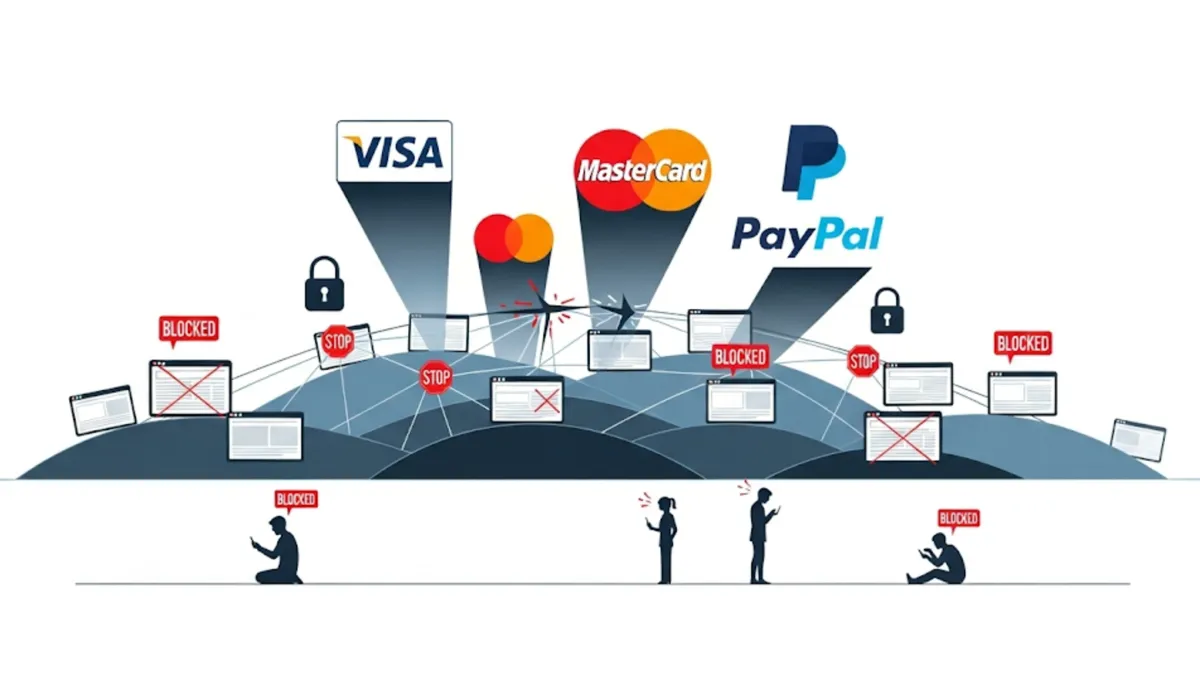
Payment processors have emerged as the primary enforcement mechanism for the UK's sweeping Online Safety Act, demonstrating how financial infrastructure serves as an extension of government regulatory power. Major European payment networks including Klarna, Adyen, and Worldpay coordinate with dominant US processors Visa, Mastercard, and PayPal to implement government content policies across digital platforms. The July 25, 2025 implementation of age verification requirements triggered a 1,400% surge in UK VPN signups, according to Proton VPN, as users seek to circumvent mandatory identity checks imposed through these coordinated payment networks.
Steam's July 15 rule changes represent just one example of this broader phenomenon. Valve Corporation updated its publishing guidelines to prohibit content that "may violate the rules and standards set forth by Steam's payment processors and related card networks and banks." The timing coincides with escalating pressure from payment companies enforcing UK regulatory compliance across global platforms.
The Online Safety Act grants unprecedented authority to payment processors in content regulation. Ofcom, the UK's communications regulator, can implement business disruption measures requiring "payment providers, advertisers and internet service providers to stop working with a site, preventing it from generating money or being accessed from the UK."
Financial networks execute government policy
The UK legislation transforms payment processors from neutral transaction facilitators into active government enforcement agents. Platforms publishing pornographic content must implement "robust age checks that meet Ofcom's guidance" or face systematic payment blocking by major card networks.
Bluesky announced July 10 that UK users must verify adult status through Epic Games' Kids Web Services, including payment card verification, ID scans, and facial age estimation technology. Users failing verification lose access to adult content and direct messaging features. The platform's compliance demonstrates how government requirements flow through payment processor demands, though concerns arise regarding Epic Games' ownership structure. Tencent, the Chinese technology conglomerate, holds a significant minority stake in Epic Games, raising questions about foreign access to UK citizens' biometric data and identity verification records collected through government-mandated systems. However, Epic Games states that KWS mandates verification providers delete personal information captured during verification, storing only hashed email addresses and verification status metadata rather than actual biometric data. The company also maintains that outside investors like Tencent have no control over day-to-day operations, no access to personal information or user data, and that Epic has never shared personal data with Tencent or stored it on Tencent's systems.
Reddit implements similar restrictions for UK users seeking "mature content" through partnerships with third-party verification specialists. According to the platform's updated policies, UK users must upload government identification or submit to biometric scanning to access age-gated communities.
Major adult content platforms now display age verification prompts stating compliance with "the UK Online Safety Act" when accessed from British IP addresses. Pornhub directs users to identity verification services, while other platforms implement facial recognition systems to estimate user ages.
Payment processors enforce these requirements through coordinated service withdrawal threats involving major US networks (Visa, Mastercard, PayPal, Stripe) and European counterparts (Adyen, Klarna, Worldpay, SumUp). The systematic approach demonstrates centralized policy implementation across diverse digital platforms regardless of their operational jurisdiction or user preferences, with processors like Square and American Express in the US coordating with European services such as Mollie and iZettle to ensure comprehensive coverage.
Government-sanctioned financial censorship expands globally
The UK model establishes international precedent for payment processor governance of digital content. European Union regulations like the Digital Services Act create similar frameworks empowering financial networks to restrict platform access based on content compliance.
Japan faces particularly aggressive payment processor enforcement following UK regulatory developments. Earlier this year, payment processors allegedly withheld funds from developers who sold games on Steam based solely on content deemed "objectionable" under evolving international standards.
The Japanese Fair Trade Commission responded with antitrust investigations into Visa's restrictive merchant practices. Japanese lawmakers, including free speech activist Councilman Yamada Taro and former Prime Minister Fumio Kishida, identified payment processors as primary threats to digital marketplace freedom.
Congressional representatives in the United States introduced the Fair Access to Banking Act specifically to counter payment processor overreach. The legislation would require service provision for all lawful activities, preventing financial companies from imposing subjective content standards beyond legal requirements.
The international scope demonstrates how payment processor control transcends national boundaries, creating de facto global content regulation through financial infrastructure rather than democratic legislative processes.
Technical enforcement creates a surveillance infrastructure
Age verification systems require unprecedented personal data collection from users seeking to access legal content. According to KWS privacy documentation, verification services collect "names, dates of birth, addresses, payment card details, and biometric data" from users proving adult status. The involvement of Epic Games in UK identity verification creates additional concerns given Tencent's substantial ownership position in the company, potentially granting Chinese entities indirect access to British citizens' personal identification data collected under government mandate.
Facial recognition technology becomes mandatory for content access under the guise of age verification. These systems create permanent biometric databases linking user identities to content consumption patterns, establishing comprehensive surveillance infrastructure operated by private companies with complex international ownership structures. The Epic Games verification system demonstrates how government-mandated data collection can inadvertently expose citizen information to foreign commercial interests through corporate partnership arrangements.
Payment card verification confirms age through temporary authorizations that create detailed transaction records. The verification process generates extensive data trails connecting individual financial accounts to specific content access attempts.
Identity document scanning requires government-issued identification submission, creating centralized databases of citizens accessing legal adult content. The mandatory documentation contradicts traditional privacy expectations while establishing monitoring systems for lawful activities.
The technical requirements effectively criminalize anonymous content consumption, forcing citizens to provide government identification for accessing materials that remain legal but increasingly regulated through payment processor enforcement.
Marketing industry transformation through regulatory capture
The payment processor enforcement model fundamentally alters digital marketing ecosystems. Age verification requirements influence advertising targeting capabilities, campaign attribution accuracy, and user acquisition costs across affected platforms.
VPN usage surges following content restrictions complicate geo-targeting accuracy and measurement reliability. Traditional location-based advertising becomes less effective as users increasingly mask their geographic locations to circumvent verification requirements.
PPC Land previously documented how advertising transparency requirements intersect with content regulation through payment processor compliance demands. The convergence creates complex compliance obligations for marketers operating across multiple platforms and jurisdictions.
Compliance costs associated with age verification systems create barriers to entry for smaller platforms while established operators can distribute regulatory expenses across large user bases. This dynamic accelerates industry consolidation toward platforms willing to accept government-mandated surveillance requirements.
The implementation demonstrates how regulatory capture operates through private financial infrastructure rather than direct government oversight, creating less visible but more pervasive content control mechanisms.
Cryptocurrency adoption accelerates amid payment restrictions
Alternative payment systems gain prominence as users and platforms seek independence from traditional financial networks controlled by major US processors (Visa, Mastercard, PayPal, Stripe, Square) and European counterparts (Adyen, Klarna, Worldpay, SumUp, Mollie). Cryptocurrency adoption increases among platforms facing pressure from coordinated enforcement actions by these payment networks, offering direct transactions without intermediary content oversight or government-mandated surveillance requirements.
Multiple gaming and content platforms now integrate cryptocurrency payments specifically to reduce dependency on government-aligned payment networks. These alternatives provide transaction processing without mandatory identity verification or content monitoring.
The development suggests long-term market shifts toward decentralized financial systems as payment processor overreach expands. Digital currencies offer potential solutions to content creator monetization challenges while maintaining user privacy and platform autonomy.
Technical circumvention methods proliferate alongside alternative payment adoption. Users develop sophisticated approaches combining VPN services, cryptocurrency transactions, and alternative platforms to access restricted content without government surveillance.
Platform consolidation accelerates under regulatory pressure
Payment processor enforcement creates systematic advantages for large platforms capable of managing complex compliance requirements and government relationships. Smaller operators struggle with regulatory complexity, payment access restrictions, and undefined content standards.
The concentration effect benefits established platforms with resources for multiple payment processor negotiations and compliance infrastructure. Independent platforms face barriers to entry through payment access restrictions and unclear enforcement standards.
Market dynamics increasingly favor platforms accepting government oversight over those maintaining editorial independence. This creates systematic bias toward restrictive content policies across digital marketplaces regardless of user demand or platform preferences.
Steam's capitulation exemplifies broader industry trends toward accepting external content control rather than risking payment processor withdrawal. The precedent establishes financial infrastructure as the primary mechanism for government content regulation.
Democratic governance versus financial control
The UK Online Safety Act implementation reveals fundamental tensions between democratic content governance and financial infrastructure control. Payment processors exercise regulatory authority without democratic accountability while implementing government policies through private commercial relationships.
Citizens face mandatory surveillance for accessing legal content without legislative debate about privacy implications or enforcement mechanisms. The approach bypasses traditional civil liberties protections by delegating enforcement to private financial companies.
Content creators and platform operators lose editorial autonomy as payment processors determine which ideas, products, and services reach consumers through digital channels. The system creates censorship through financial pressure rather than transparent regulatory processes.
The development represents broader questions about democratic control over digital marketplace governance and the appropriate role of financial infrastructure in content regulation. Additional concerns emerge regarding data sovereignty when government-mandated verification systems involve companies with foreign ownership stakes, such as Epic Games' relationship with Chinese conglomerate Tencent, potentially exposing UK citizens' personal data to international commercial interests beyond democratic oversight.
International resistance movements emerge
Japanese authorities initiated the first systematic pushback against payment processor content control through antitrust enforcement and regulatory investigations. The Japanese approach focuses on financial competition rather than content standards, offering alternative regulatory models.
European privacy advocates challenge age verification requirements as disproportionate surveillance measures violating data protection principles. The European Data Protection Board established guidelines requiring "least intrusive measures available while maintaining effectiveness."
American legislative initiatives target payment processor discretion over legal transactions through banking regulation rather than content law. The Fair Access to Banking Act represents bipartisan recognition of financial infrastructure overreach concerns.
International resistance demonstrates growing awareness of payment processor control as distinct from traditional content regulation, requiring specialized legal and regulatory responses focused on financial competition and democratic governance principles.
 PPC LandLuis Rijo
PPC LandLuis Rijo
Timeline
- October 26, 2023: UK's Online Safety Act receives Royal Assent, establishing payment processor enforcement authority
- January 17, 2025: Age verification duties take effect for UK platforms, implemented through payment processor compliance
- March 17, 2025: Ofcom gains full enforcement powers including payment processor restriction authority
- July 10, 2025: Bluesky announces UK age verification through payment card systems
- July 15, 2025: Steam updates rules following payment processor pressure from UK compliance requirements
- July 24, 2025: Deadline for children's risk assessments under UK regulations enforced through financial networks
- July 25, 2025: UK Online Safety Act enforcement triggers 1,400% VPN surge as users circumvent payment processor surveillance
- July 27, 2025: Continued resistance to payment processor enforcement of government censorship policies
Key Terms Explained
Payment Processors
Payment processors function as financial intermediaries facilitating electronic transactions between consumers, merchants, and banks. Major US processors include Visa, Mastercard, PayPal, Stripe, Square, and American Express, while European networks encompass Adyen, Klarna, Worldpay, SumUp, Mollie, and iZettle. In the context of the UK Online Safety Act, these companies have evolved beyond their traditional role to become active enforcement agents for government content policies. These organizations now determine which platforms can access financial services based on compliance with regulatory requirements, effectively controlling digital marketplace participation through coordinated transaction approval or denial across both US and European markets.
UK Online Safety Act
The UK Online Safety Act represents comprehensive legislation establishing government authority over digital platform content through regulatory frameworks implemented by financial networks. Enacted in 2023 with enforcement beginning in 2025, the Act requires platforms to implement age verification systems, content monitoring mechanisms, and compliance reporting structures. The legislation demonstrates how democratic governments can achieve content control through private sector partnerships rather than direct censorship, creating enforcement mechanisms that operate beyond traditional civil liberties protections.
Age Verification
Age verification encompasses technical and procedural systems requiring users to prove adult status before accessing specific digital content categories. Under UK regulations, verification methods include government identification scanning, biometric facial recognition, payment card authorization, and third-party identity services such as Epic Games' Kids Web Services. These systems create comprehensive databases linking individual identities to content consumption patterns while establishing mandatory surveillance infrastructure for accessing legal materials that were previously anonymous. The involvement of companies with foreign ownership, such as Epic Games' significant minority shareholder Tencent, raises additional concerns about international access to UK citizens' personal verification data collected under government mandate.
Steam Platform
Steam operates as the dominant PC gaming distribution platform controlled by Valve Corporation, serving millions of users globally through digital game sales and community features. The platform's July 2025 policy changes demonstrate how international businesses must adapt to UK regulatory requirements transmitted through payment processor compliance demands. Steam's experience illustrates broader industry trends toward accepting external content control rather than risking financial infrastructure access, establishing precedent for government influence over private platform governance.
Ofcom Enforcement
Ofcom functions as the UK's independent communications regulator with expanded authority under the Online Safety Act to direct payment processor compliance and platform access restrictions. The organization possesses enforcement powers including financial penalties up to £18 million or 10% of worldwide revenue, criminal prosecution capabilities for senior managers, and business disruption measures requiring payment providers to cease platform services. Ofcom's role demonstrates how regulatory agencies can achieve content control through financial infrastructure coordination rather than direct platform oversight.
Content Regulation
Content regulation describes systematic government control over digital information through compliance requirements, enforcement mechanisms, and private sector partnerships. The UK model employs payment processor dependencies to achieve content restrictions that would face significant resistance through traditional regulatory channels. This approach creates comprehensive censorship infrastructure operated by financial companies while maintaining plausible deniability about government involvement in content decisions, effectively privatizing authoritarian control mechanisms.
Financial Infrastructure
Financial infrastructure encompasses the networks, systems, and institutions facilitating electronic commerce and digital transactions globally. Payment processors leverage this infrastructure to implement government content policies by threatening service withdrawal from non-compliant platforms. The concentration of transaction processing among few major companies creates systematic vulnerabilities where financial networks can control information access, commerce participation, and platform viability through coordinated policy enforcement.
VPN Surge
VPN surge refers to the dramatic 1,400% increase in UK virtual private network subscriptions following Online Safety Act enforcement, representing direct citizen resistance to government-mandated surveillance requirements. Users adopt VPN services to circumvent geographic restrictions, identity verification systems, and content monitoring mechanisms imposed through payment processor compliance. The surge demonstrates public rejection of mandatory surveillance while highlighting technical methods for maintaining privacy and anonymous content access.
Compliance Requirements
Compliance requirements encompass the technical, procedural, and reporting obligations platforms must meet to maintain payment processor services and avoid regulatory penalties. Under UK regulations, requirements include robust age verification systems, content monitoring capabilities, user data collection mechanisms, and regular compliance reporting to government authorities. These requirements create significant operational costs while establishing comprehensive surveillance infrastructure that extends government oversight into private digital communications and content consumption.
Platform Governance
Platform governance describes the systems, policies, and enforcement mechanisms controlling digital marketplace operations, content availability, and user access rights. The UK Online Safety Act fundamentally alters platform governance by introducing external authorities with veto power over platform policies through payment processor coordination. This development transforms platform operators from autonomous businesses into government compliance agents, demonstrating how regulatory capture can achieve content control through financial pressure rather than democratic legislative processes.
Summary
Who: Payment processors Visa, Mastercard, and PayPal are implementing UK government censorship policies across global platforms including Steam, Bluesky, Reddit, and adult content sites. Ofcom serves as the UK enforcement authority directing financial network compliance.
What: The UK Online Safety Act transforms payment processors into government enforcement agents requiring age verification, identity documentation, and biometric scanning for accessing legal content. Platforms must comply with payment processor demands or lose transaction capabilities entirely.
When: Implementation began January 17, 2025, with full enforcement starting July 25, 2025. The systematic approach demonstrates coordinated government-financial industry collaboration in content regulation.
Where: The UK serves as the primary jurisdiction, but enforcement extends globally through payment processor compliance requirements affecting international platforms serving British users.
Why: Government officials claim child protection justifications while establishing comprehensive surveillance infrastructure and content control mechanisms operated through private financial networks rather than direct regulatory oversight.

